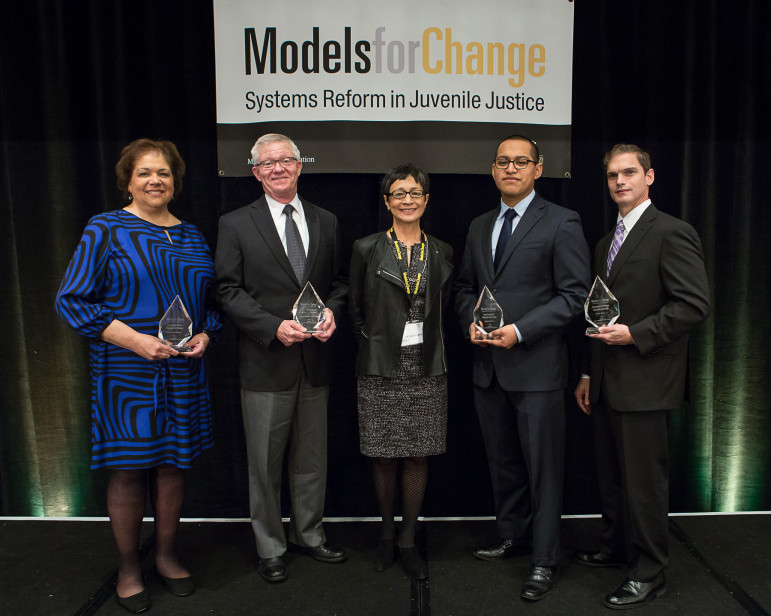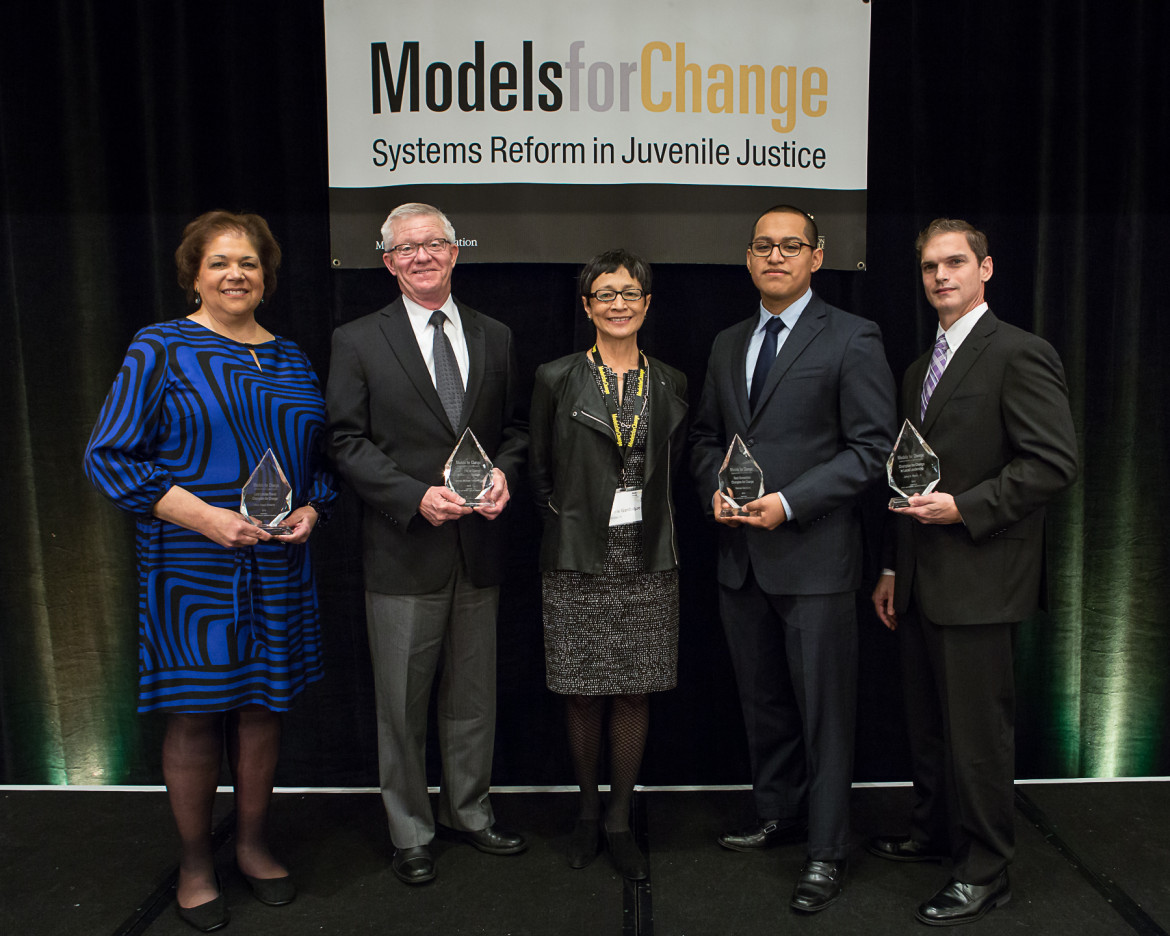
David T. Kindler
Left to right, Juvenile Court Judge Sheri C. Roberts; retired Judge George W. Timberlake; Laurie Garduque, MacArthur Foundation; Hernan Carvente, John Jay College of Criminal Justice; and John Ryals, Jefferson Parish Department of Juvenile Services.
WASHINGTON — George W. Timberlake retired from the Illinois bench in 2006 — but certainly not from juvenile justice work.
Since 2004, Timberlake has devoted countless hours to five demonstration Models for Change reforms in Illinois supported by the John D. and Catherine T. MacArthur Foundation.
And since 2010 — when he was appointed chairman of the Illinois Juvenile Justice Commission, a federally mandated state advisory group to the Illinois governor and the state General Assembly — Timberlake and others drawn largely from the ranks of Models for Change have played a pivotal role in reviving the volunteer commission.
On Monday, Timberlake received one of four prestigious awards for juvenile justice leaders from the Chicago-based MacArthur Foundation.
In brief remarks after being named the Champion for Change in State Leadership, Timberlake thanked and praised those who had helped him turn around what had been a struggling juvenile justice organization.
He also credited his parents with teaching him and his six siblings lessons like the importance of racial equality.
“Black lives matter!” Timberlake said, drawing a standing ovation from more than 400 people at an awards luncheon at the seventh annual Champions for Change Awards, part of the ninth annual Models for Change national working conference.
During Timberlake’s chairmanship, the IJJC altered the strategy for federal juvenile justice grant spending in Illinois so that the funds now go toward an array of state and local initiatives designed to produce reform-minded data while strengthening local collaboration and supporting statewide system improvement.
On his watch, the IJJC also has conducted invaluable research providing analysis to policymakers, juvenile justice advocates and the public and leading to overdue changes in state law and policy.
A 2011 IJJC report on a juvenile parole program led the executive and legislative branches to support reforms.
A 2013 IJJC report on raising the age of juvenile court jurisdiction paved the way to passage of legislation removing 17-year-olds from adult court jurisdiction.
And an IJJC report published this year scrutinized harsh and ineffective responses to youth who have committed sex offenses, leading to debate about the registry.
The three other awards Monday went to:
- Judge Sheri Capes Roberts of Newton County (Ga.) Juvenile Court. Roberts is known for a holistic approach addressing the needs of the entire family in a youth’s case. Her work with dual-status youth — those involved in both the juvenile justice and child welfare system — is part of the influential Robert F. Kennedy National Resource Center’s Dual Status Youth Practice Network. The Newton County dual-status work also is supported by MacArthur. Roberts also serves as a member of the Delinquency Court Improvement Initiative of the National Council of Juvenile and Family Court Judges. She received the Lucy Louisa Flower Champion for Change award. Her work led Cook County, Ill., to establish the first juvenile court to hear cases of children under 16 in 1899.
- Hernan Carvente shot a rival gang member in Queens, N.Y. in 2006 and was convicted of second-degree attempted murder, just two days shy of his 16th birthday. If he had been 16 when he was charged, he would have been sentenced as an adult in New York state. Instead, he served at a juvenile facility and took college-level classes. Carvente, now 22, is a senior at the City University of New York John Jay College of Criminal Justice, focusing on juvenile justice reform. He also works as a research assistant at the Vera Institute of Justice and serves on the New York State Juvenile Justice Advisory Group. Carvente received the Next Generation Champion for Change award.
- John S. Ryals Jr., the evaluation/treatment supervisor for the Jefferson Parish (La.) Department of Juvenile Services, is credited with helping Louisiana become a leader in the use of evidence-based practices. The percent of his treatment budget going to evidence-based practices climbed from 9 percent in 2007 to more than 95 percent in 2013. He is a widely sought trainer and consultant in evidence-based screening, assessment, treatment services and models for probation review and reform in Louisiana and across the country. Ryals received the Champion for Change in Local Leadership award.
In a written letter to the award recipients, MacArthur Foundation interim President Julia Stasch said: “No movement proceeds on the strength of research alone. Reform is animated by the passion and tenacity of the people who make a cause their cause. ...”
“The true legacy of a champion is the lasting effect their vision, energy and steadfast belief have on our young people, their families and communities.”

Pingback: JJI Board Member Judge Timberlake Honored as Champion for Change | Chicago Activism